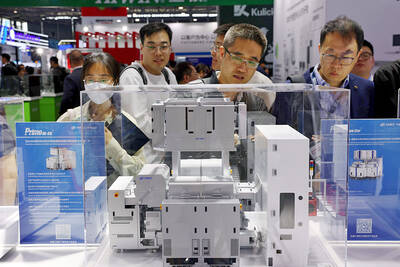The government has launched a three-pronged strategy to attract local and international talent, aiming to position Taiwan as a new global hub following Nvidia Corp’s announcement that it has chosen Taipei as the site of its Taiwan headquarters.
Nvidia cofounder and CEO Jensen Huang (黃仁勳) on Monday last week announced during his keynote speech at the Computex trade show in Taipei that the Nvidia Constellation, the company’s planned Taiwan headquarters, would be located in the Beitou-Shilin Technology Park (北投士林科技園區) in Taipei.
Huang’s decision to establish a base in Taiwan is “primarily due to Taiwan’s talent pool and its strength in the semiconductor supply chain,” Minister of Economic Affairs J.W. Kuo (郭智輝) said.

Photo: Ann Wang, Reuters
Nvidia’s plan to set up its research and development and operations center in Taipei is also likely to attract digital nomads from around the world, Kuo said.
National Development Council Department of Human Resources Development Director Hsieh Chia-yi (謝佳宜) said Nvidia’s announcement is expected to drive a major shift in the talent market, reaffirming Taiwan’s position as a favorable environment for international talent development.
This year, the council’s talent policy would focus on three directions, which include amending the Act for the Recruitment and Employment of Foreign Professionals (外國專業人才延攬及雇用法), Hsieh said.
By revising the law, the government aims to expand eligibility for talent recruitment, increase legal flexibility for digital nomads, simplify the process of obtaining permanent residency and enhance social security, she said, adding that the Cabinet has reviewed a draft bill, which is pending approval.
Hsieh further said that the talent policy also includes a plan aimed at attracting overseas Taiwanese talent, coupled with a targeted recruitment program.
Many overseas Taiwanese professionals are reaching middle age and “are at a turning point in life,” she said.
Meanwhile, the global supply chain is undergoing restructuring, with many major companies investing in Taiwan and some Taiwanese enterprises expanding their overseas presence, Hsieh said.
The developments are creating strong demand for international talent, she added.
As such, the council aims to serve as a “bridge” between employers in need of talent and skilled overseas Taiwanese professionals, and would work to attract the latter back to Taiwan for employment, Hsieh said.
In addition, in January, the council launched a pilot program for “digital nomads,” offering a visa for foreign professionals who can work remotely, which would be valid for up to 3+3 months.
The goal is to first attract foreign talent to Taiwan, with the hope that once they experience and grow fond of the country, they would choose to stay longer, Hsieh said.

With this year’s Semicon Taiwan trade show set to kick off on Wednesday, market attention has turned to the mass production of advanced packaging technologies and capacity expansion in Taiwan and the US. With traditional scaling reaching physical limits, heterogeneous integration and packaging technologies have emerged as key solutions. Surging demand for artificial intelligence (AI), high-performance computing (HPC) and high-bandwidth memory (HBM) chips has put technologies such as chip-on-wafer-on-substrate (CoWoS), integrated fan-out (InFO), system on integrated chips (SoIC), 3D IC and fan-out panel-level packaging (FOPLP) at the center of semiconductor innovation, making them a major focus at this year’s trade show, according

DEBUT: The trade show is to feature 17 national pavilions, a new high for the event, including from Canada, Costa Rica, Lithuania, Sweden and Vietnam for the first time The Semicon Taiwan trade show, which opens on Wednesday, is expected to see a new high in the number of exhibitors and visitors from around the world, said its organizer, SEMI, which has described the annual event as the “Olympics of the semiconductor industry.” SEMI, which represents companies in the electronics manufacturing and design supply chain, and touts the annual exhibition as the most influential semiconductor trade show in the world, said more than 1,200 enterprises from 56 countries are to showcase their innovations across more than 4,100 booths, and that the event could attract 100,000 visitors. This year’s event features 17

Germany is to establish its first-ever national pavilion at Semicon Taiwan, which starts tomorrow in Taipei, as the country looks to raise its profile and deepen semiconductor ties with Taiwan as global chip demand accelerates. Martin Mayer, a semiconductor investment expert at Germany Trade & Invest (GTAI), Germany’s international economic promotion agency, said before leaving for Taiwan that the nation is a crucial partner in developing Germany’s semiconductor ecosystem. Germany’s debut at the international semiconductor exhibition in Taipei aims to “show presence” and signal its commitment to semiconductors, while building trust with Taiwanese companies, government and industry associations, he said. “The best outcome

Semiconductor equipment billings in Taiwan are expected to double this year, as manufacturers in the industry are keen to expand production to meet strong global demand for artificial intelligence applications, according to SEMI, which represents companies in the electronics manufacturing and design supply chain. Speaking at a news conference before the opening of Semicon Taiwan trade show tomorrow, SEMI director of industry research and statistics Clark Tseng (曾瑞榆) said semiconductor equipment billings in Taiwan are expected to grow by an annual 100 percent this year, beating an earlier estimate of 70 percent growth. He said that Taiwan received a boost from a